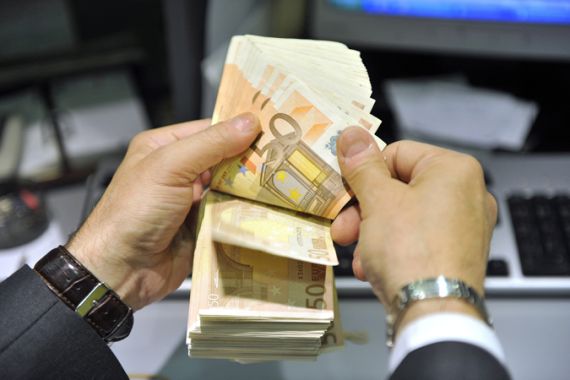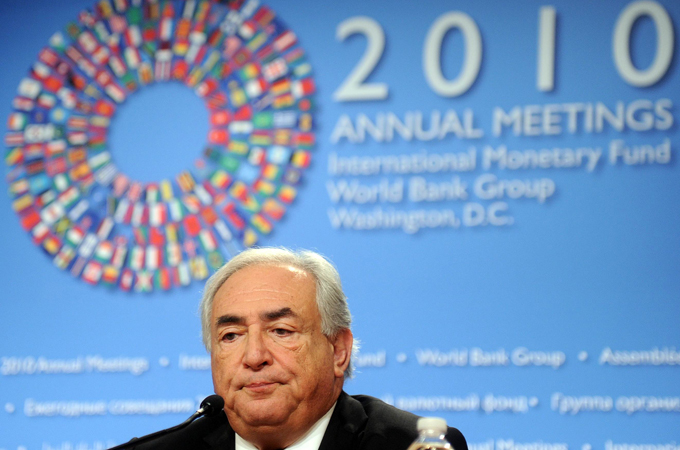IMF warns of real threat to economy
Ongoing currency crises between the US and China cannot end well, chief of international lender tells Al Jazeera.

 |
| As finance ministers and central bankers meet in Washington, Strauss-Kahn sounds ‘currency war’ warning [IMF] |
The IMF chief has said that a “real threat” exists due to a currency dispute between the world’s largest economies which are meeting in Washington.
Finance ministers and central bankers from 187 countries will convene for an annual meeting of the International Monetary Fund on Friday, amid warnings that “beggar-thy-neighbour” policies could wreck the global recovery.
Keep reading
list of 4 itemsBoeing hit with 32 whistleblower claims, as dead worker’s case reviewed
US imposes new sanctions on Iran after attack on Israel
A flash flood and a quiet sale highlight India’s Sikkim’s hydro problems
“The consensus to work together has a bit decreased, and one sign of this is the different declaration by different countries that they may try to manipulate their currencies and this kind of currency never ends well,” Dominique Strauss-Kahn, managing director of the IMF, told Al Jazeera.
“What we need is more co-ordination again rather than beggar-thy-neighbour.”
With the global recovery still slow, a range of countries from Japan to Colombia have in recent weeks intervened to stop their currencies from rising to levels that would make exports prohibitively expensive.
But the summit is set to be dominated by a long running and increasingly antagonistic dispute between the US and China – whose weak yuan policies are accused of slowing the global recovery and hurting American jobs.
Despite the yuan’s gains against the dollar since China allowed more movement in June, IMF economists estimated that the yuan is 5-27 per cent undervalued.
Possible sanctions
While the US congress moves toward enforcing retaliatory sanctions on Chinese goods, Washington has increased the pressure by hinting that China may not be allowed a bigger say at the IMF unless the currency issue is resolved.
US officials are adamant that the IMF meetings should address the need for “market oriented exchange rates” and a fundamental “rebalancing” of the global economy.
But on the eve of the meeting, Strauss-Kahn said that there was no “formal” link between the two issues, but the US was “right” to call for reform.
“I think it is right to insist on the fact that the more an emerging country will have a voice and representation in the fund, the more they have a responsibility in the stability of the system.”
“You can be at the centre of the system, or you can be at the border of the system. But if you want to be at the centre of the system … it goes with having more responsibility.”
China has rebuffed pressure to lift the value of the yuan, fearing it would put Chinese businesses at risk.
Meanwhile, European officials said that a rapidly rising euro, victimised by an undervalued US dollar and Chinese yuan, could threaten eurozone recovery and vowed to press both Washington and Beijing to take action.
Sharing power
India said that imbalances in the global economy have become “unsustainable” but called on major economies to avoid confrontation to avert a feared currency war.
The IMF said that rich and emerging economies must dramatically change the way they trade with each other or risk throttling the recovery.
In its latest economic outlook, the IMF said growth would slow more than previously expected in 2011, as the US, Europe and Japan continue to struggle and China remains overly dependent on exports.
Wading into sensitive political waters, the IMF said China must allow its currency to strengthen to boost domestic demand and reduce its reliance on exports.
“To the extent that a stronger Chinese currency eases this process, other surplus countries in the region could follow suit, which would facilitate the needed shift towards domestic sources of growth,” it said.
As part of that rebalancing IMF members are also expected to discuss how to reform decision-making at the fund, giving more say to emerging and developing economies.
Europe, seen as a major loser from the reshuffle, has been reluctant to reduce its voting share or representation on the IMF’s decision-making board.
European finance ministers last week agreed to review representation at the IMF, but attached significant conditions.
Of the 24 seats on the IMF’s board, Europe currently holds nine and said it was willing to rotate two of those spots with emerging markets.